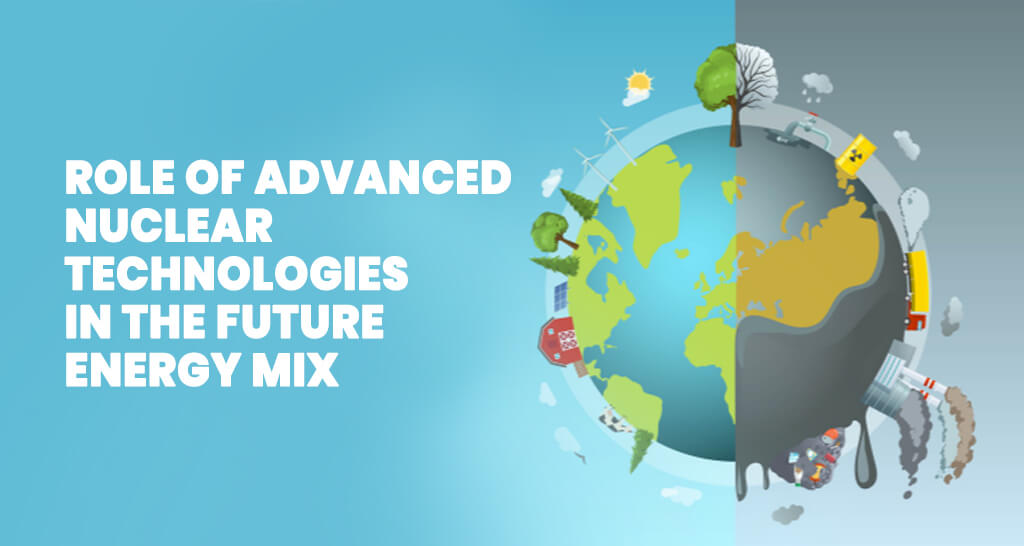A recent issue all across the globe is climate change which is emerging as the biggest concern. Countries in various parts of the world are making strategies to come up with renewable energy sources to deal with climate change.
The recent scenario is anticipated to result in zero energy by 2050. Looking for advanced renewable energy resources is the recent fix to manage the limitations considerably. Today, we’ll examine how nuclear technologies can efficiently tackle the future energy mix.
Limitations resulting in an energy crisis include:
- Larger land footprints.
- Power generation constraints.
- Supply chain issues.
- Battery storage.
- Restricted use of raw materials.
This has resulted in the dependency on fossil fuels that meet the increased energy requirements. Reduction in natural gas is also an emerging concern for energy security globally!
Nuclear Energy- A Boon to Future Energy Requirements!
Recent studies show that nuclear energy will emerge as the ultimate solution to manage renewable energy utilization amidst climate change. Nuclear power is generated through the isotope U-235, which controls fission reactions. This energy can substantially curb coal and natural gas and prevent the release of greenhouse gases and certain matter in houses.
Nuclear energy is also helpful in large-scale base load energy generation, and it also helps in flawless integration through diverse renewable sources like solar or wind. It also mitigates the risks and challenges related to energy independence and the security of energy.
The History Behind Nuclear Technologies
Earlier, the people’s outlook and conception served as the primary roadblock to nuclear energy expansion and the development of nuclear reactors. After a series of events that happened in the past, people are skeptical about the use of nuclear reactors due to their concerns about nuclear waste management.
This has resulted in further conservation of civil nuclear energy. Other reasons for its restricted use are higher capital costs and the restricted policy support that diverse investors’ confidence in technology. Most of these systems are based on boiling water, heavy water and water reactor systems referred to as generation III and generation III+ nuclear reactors.
Recent generations of these nuclear reactors comprise a few modular and generation IV reactors. They are packed with a passive safety system that implies natural forces like natural circulation, heat conduction and gravity to ensure complete shutdown and heat removal in emergencies.
It will also display resilience to cope with natural events such as Tsunamis and Earthquakes with the help of advanced fuel designs. All of this has helped transform people’s perception of using nuclear technologies as an energy substitute in the future.
Implementation of Nuclear Technologies for Power Generation in the Future
The benefit of an extended operating lifetime and better economics with the latest generation reactors can help provide more affordable and stable nuclear energy solutions. It is the need of this hour, and experts are finding ways to implement it in the recent system. Small modular reactors (SMRs) can have a massive impact on the future energy mix.
SMRs can immensely benefit the decarbonization process utilized in various industrial sectors. The small reactors with a capacity of lesser than 300 MW can efficiently provide off-location manufacturing, higher quality control, better safety, quicker transportation, decommissioning, and even affordability.
Besides, the nuclear energy industry’s stakeholders are also willing to go ahead with the idea of Gen IV reactors development. They can prove helpful in replacing generation III or better reactors that consist of the molten salt reactor, high-temperature reactor, gas-cooled reactor and load-cooled fast reactors.
They use distinct fuel types, such as thorium or uranium, for this purpose. This can eventually support restricting the fuel supply and minimizing reliance on conventional uranium resources.
Wrapping Up
Recently, nuclear energy is already making a recognizable contribution to controlling carbon emissions and will be a crucial part of the global energy mix. As per the recent report, the tentative share of nuclear energy in the future energy mix was just 10% which needs to be increased to 25% by the end of 2050 to derive desired targets.
This rise in nuclear power generation can prove helpful in getting the desirable GHG emission reduction and seeking better energy independence. Nuclear energy is a cost-competitive alternative backed by baseload power production technology that comprises coal and combined cycle power plants.
Developed countries like Japan, South Korea and France are already reversing their decisions of reducing nuclear power and developing new power plants for generating more renewable energy sources.



Discussion about this post